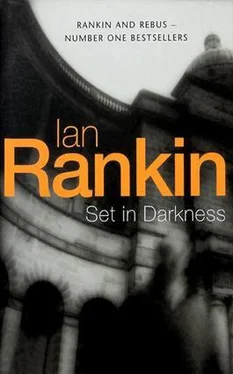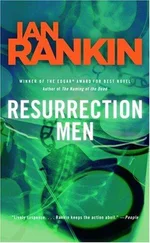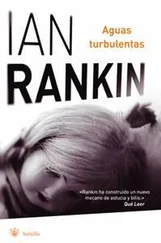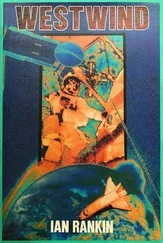‘Thank you.’ She looked as if she hadn’t moved all the time he’d been away.
‘I keep wondering’, she said, ‘when you’ll get round to me. I mean, all this other stuff is just a roundabout way of getting there, isn’t it?’
‘You’ve lost me.’ Rebus took the notebook and pen from his pocket, laid them on the desk.
‘Roddy and me,’ she said, leaning towards him. ‘The affair we were having. Is it time to talk about that now?’
Right hand reaching for the pen, Rebus agreed that it was.
‘It’s like that in politics.’ She paused. ‘Well, any profession really. Two people working closely together.’ She sipped the coffee. ‘Politicians are nothing if not gossips. I think it’s down to a lack of self-confidence. Bad-mouthing everyone else is such a simple option.’
‘So you weren’t actually having an affair?’
She looked at him, smiled. ‘Did I give that impression?’ Bowed her head slightly in apology. ‘What I should have said was, the rumoured affair. And that’s as far as it got. You didn’t know?’
He shook his head.
‘All these interviews... I thought someone would have...’ She straightened in her chair. ‘Well, maybe I’ve misjudged them.’
‘You’re really the first person we’ve spoken to.’
‘But you’ve talked to the clan?’
‘You mean Mr Grieve’s family?’
‘Yes.’
‘They knew?’
‘Seona knew. I’m assuming she didn’t keep it to herself.’
‘Did Mr Grieve tell her?’
She smiled again. ‘Why should he? There wasn’t any truth in it. If someone here made a sly reference about you, would you report it to your wife?’
‘So how did Mrs Grieve find out?’
‘The usual way. Our old friend, Anonymous.’
‘A letter?’
‘Yes.’
‘Just the one?’
‘You’ll have to ask her.’ She placed her beaker on the table. ‘You’re dying for a cigarette, aren’t you?’ Rebus looked at her. She nodded towards his pen, which was raised to his mouth. ‘You keep doing that,’ she said. ‘And I wish you wouldn’t.’
‘Why’s that, Ms Banks?’
‘Because I’m gasping for one myself.’
Smoking at St Leonard’s was restricted to the rear car park. Since this was off-limits to the public, he stood with Josephine Banks on the pavement out front, the pair of them shuffing their feet as they enjoyed their individual fixes.
Nearing the end of his cigarette, perhaps to defer the moment when he would have to finish it, he asked her if she’d any idea who had written the letter.
‘Not a clue.’
‘It had to be someone who knew you both.’
‘Oh, yes. I’m guessing it was someone in the local party. Or maybe a sore loser. The selection process for candidates, it was pretty rough at times.’
‘How so?’
‘Old Labour versus New. Ancient grievances given fresh momentum.’
‘Who stood against Mr Grieve?’
‘There were three others: Gwen Mollison, Archie Ure and Sara Bone.’
‘Was it a fair fight?’
A mixture of smoke and chilled breath billowed from her mouth. ‘As these things go, yes. I mean, there weren’t any dirty tricks.’
Something in her tone made him ask: ‘But?’
‘There was a certain amount of bad feeling when Roddy won the vote. Mostly from Ure. You must have seen it in the papers.’
‘Only if it reached the sports pages.’
She looked at him. ‘You are going to vote?’
He shrugged, examined what was left of his cigarette. ‘Why was Archie Ure so upset?’
‘Archie’s been in the Labour Party for donkey’s. And he believes in devolution. Back in ’79, he canvassed half of Edinburgh. Then along comes Roddy, snatches his birthright from under his nose. Tell me, did you vote in ’79?’
March 1, 1979: the failed devolution referendum. ‘I don’t remember,’ Rebus lied.
‘You didn’t, did you?’ She watched him shrug. ‘Whyever not?’
‘I wasn’t the only one.’
‘I’m just curious. It was bitter cold that day, maybe the snow put you off.’
‘Are you poking fun at me, Ms Banks?’
She flicked her cigarette stub into the road. ‘I wouldn’t dare, Inspector.’
1979.
He remembered Rhona, his wife at the time, with her roll of ‘Vote Yes’ stickers. He kept finding them on his jackets, the car windscreen, even on the flask he sometimes took with him to work. The winter had been hell: dark and freezing and with strikes breaking out all over. The Winter of Discontent, the papers called it, and he wasn’t about to disagree. His daughter Sammy was four. When he and Rhona had arguments, they kept their voices down so as not to wake her. His work was a problem: not enough hours in the day. And recently Rhona had been becoming active politically, campaigning for the SNP. For her, devolution meant a step towards independence. For Jim Callaghan and his Labour government, it meant... well, Rebus was never sure exactly. A sop to the Nationalists? Or to the nation as a whole? Would it really strengthen the Union?
They argued politics at the kitchen table until Rebus became bored by it all. He would fall on to the sofa and tell Rhona he didn’t care. At first she would stand in front of him, blocking his view of the TV screen. Her arguments were cogent as well as passionate.
‘I really can’t be scunnered,’ he’d say when she finished, and she’d start hitting him with a cushion until he wrestled her down on to the carpet, the pair of them laughing.
Maybe it was because he was getting a reaction. Whatever, his intransigence grew. He wore a ‘Scotland Says NO’ badge home one night. They were at the kitchen table again, eating supper. Rhona looked tired: day job and childcare and out canvassing. She didn’t say anything about his badge, even when he unpinned it from his coat and fixed it to his shirt. She just stared at him with deadened eyes, and wouldn’t talk the rest of the evening. In bed, she turned her back on him.
‘I thought you wanted me to get more political,’ he joked. She stayed silent. ‘I’m serious,’ he said. ‘I’ve thought through the issues like you said, and I’ve decided to vote No.’
‘You do what you want,’ she said coldly.
‘I will then,’ he answered, his eyes on her hunched form.
But on the day, 1 March, he did something worse than voting No. He didn’t vote at all. He could blame work, the weather, any number of things. But really, it was to make Rhona suffer. He knew this as he watched the office clock, watched the hands pass the referendum’s close. With minutes left, he almost dashed for his car, but told himself it was too late. It was too late.
Felt like hell on the drive home. She wasn’t there; was off somewhere to watch ballot boxes being emptied, or with like-minded people in the back room of a pub, awaiting news of exit polls.
The babysitter left him to it. He looked in on Sammy, who was fast asleep, one arm cradling Pa Broon, her favoured teddy bear. It was late when Rhona returned. She was a little bit drunk, and so was he: four cans of Tartan Special in front of the TV. He had the picture on but the sound down, listening to the hi-fi. He was about to tell her that he’d voted No, but knew she’d see through the lie. Instead, he asked how she was feeling.
‘Numb,’ she said, standing in the doorway, as if reluctant to enter the room. ‘But then,’ she said, turning back into the hall, ‘that’s almost an improvement.’
March 1, 1979. The referendum had a clause attached, 40 per cent of the electorate had to vote Yes. The rumour was the Labour government down in London wanted obstacles put in the way of devolution. They feared that Scottish Westminster MPs would be lost, and that the Conservatives would be gifted a permanent majority in the Commons. Forty per cent had to vote Yes.
Читать дальше












